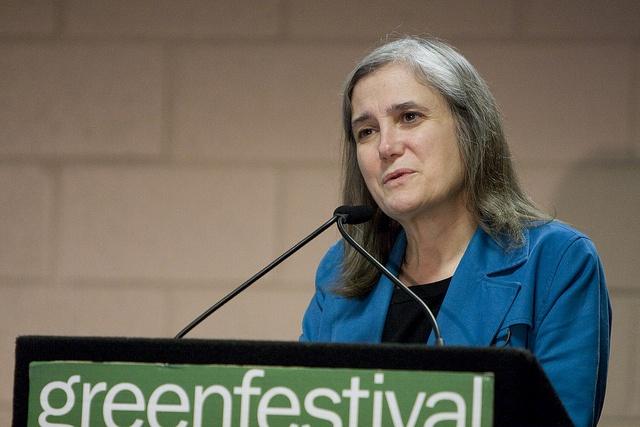
Last week, a North Dakota county issued an arrest warrant for a journalist who reported on the bloody standoff between protesters and Dakota Access Pipeline (DAPL) security guards days before. Democracy Now! host Amy Goodman followed protesters onto a construction site over the Labor Day weekend in order to cover the developing story. Her report and photos of security dogs being directed to harass and bite protesters went viral that night. Days later, Morton County issued a warrant for her arrest for criminal trespass.
While media outlets around the world denounced the call for her arrest, Goodman is only one of several journalists to find themselves on the wrong side of the law for doing their job. Goodman herself was quick to accuse the county of violating her rights.
"This is an unacceptable violation of freedom of the press," Goodman said in a Democracy Now! statement. "I was doing my job by covering pipeline guards unleashing dogs and pepper spray on Native American protesters.”
But as reporters continue to discover, in the eyes of local law enforcement, the journalist's right to tell a story may be protected under the First Amendment, but their right to uncover the story isn't.
And the issue seems to be more than whether the reporter "trespassed" in an effort to report the story. In 2014, at least six journalists were taken into custody during clashes between protesters and police in Ferguson, Missouri. One was Getty photographer Scott Olson, who routinely supplies photos to media outlets around the world. At least three reporters said they were detained for a "few hours" during the height of the protests and then released once they subsided. According to journalists covering the Ferguson demonstrations, those who weren't arrested were expected to research and report their stories from a cordoned-off area far from the actual police lines.
This summer, journalists covering a Black Lives Matter protest in Baton Rouge, Louisiana, after 37-year-old Alton Sterling was shot by police, found themselves in a similar predicament. Five journalists were arrested during the protest and charged with "obstruction of a highway" while doing their job, according to a statement released by Reporters without Borders. Those charged included the assistant news director for the local station WAFB, who allegedly stepped momentarily onto the highway to get a better shot of the protest.
The right of access is a prickly issue for news journalists who often assume their right to dig for a story is inherent in their right to report what they found. After all, they argue, how else are they going to accurately substantiate and report stories to the public? How will they be able to interview observers and accurately time-stamp the events they report? For environmental organizations and interest groups concerned with water and environmental conservation, it's a valid question that goes far beyond whether a reporter can meet a press deadline or make a living. As Goodman's report on the DAPL protest demonstrates, the world seems to listen more closely and become more engaged in critical issues when people have a front-row-seat to a debate.
And to that end, journalists aren't the only ones finding roadblocks thrown in their way. Last spring, the North Carolina Public Utilities Commission informed the environmental organization NCWARN that if it wanted to appeal a $1.1 billion infrastructure project being built by Duke Energy, it would be required to post a $10 million bond.
The decision came after Duke Energy argued that any delays to its project could cost the company upwards of $140 million. After the nonprofit said it would be unable to meet the monetary demand, the Commission issued a permit to Duke Energy. The company then asked the Commission to increase the bond to $240 million for any further appeals, arguing that any interruption to its fast-tracked construction would cost even more to the energy company. Needless to say, the bond -- much like the controversy surrounding journalist arrests -- has a chilling effect on public scrutiny and environmental advocacy.
The impact such bonds can have on environmental advocacy was also summed up by Richard M. Clerkin, executive director of the the Institute for Nonprofits at North Carolina University: "Regardless of where we as individual residents of North Carolina stand on the environmental and business interests at stake in this matter, we ought to be collectively concerned about nonprofits needing to 'pay to play' when they raise their voices about public policies."
The Committee to Protect Journalists has the same kind of message when it comes to the arrest or unexplained detention of journalists trying to gather information at protests and in other controversial settings. It issued a list of eight steps that journalists would be advised to take "to avoid getting in harm's way or risking arrest" when reporting in settings of potential conflict -- which, they say, also include U.S. presidential conventions.
Of course, many reporters already put many of those points into practice, including by Amy Goodman, whose arrest warrant wasn't announced almost a week after her broadcast. With both sides of the DAPL conflict equally intent to exercise their assumed rights, journalists may find it increasingly difficult to do a job that starts with the right to information -- and the assumption that they won't be incarcerated for accessing it.
Image: Flickr/Chris Eaves
Jan Lee is a former news editor and award-winning editorial writer whose non-fiction and fiction have been published in the U.S., Canada, Mexico, the U.K. and Australia. Her articles and posts can be found on TriplePundit, JustMeans, and her blog, The Multicultural Jew, as well as other publications. She currently splits her residence between the city of Vancouver, British Columbia and the rural farmlands of Idaho.














